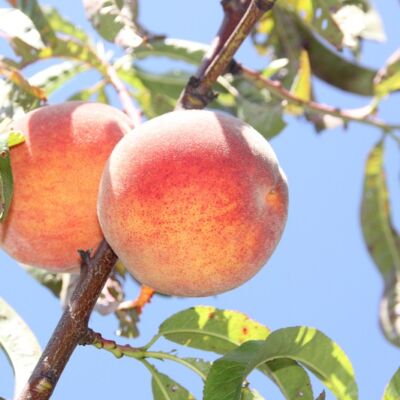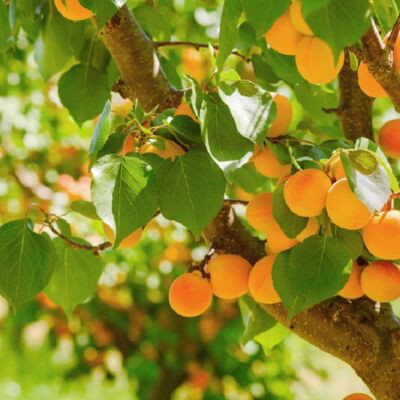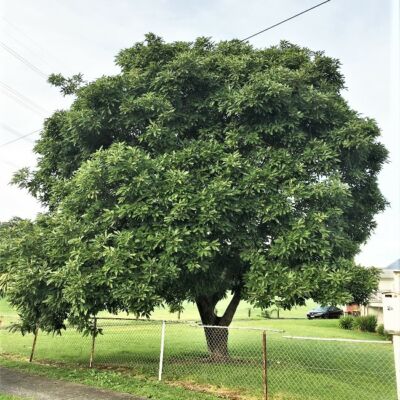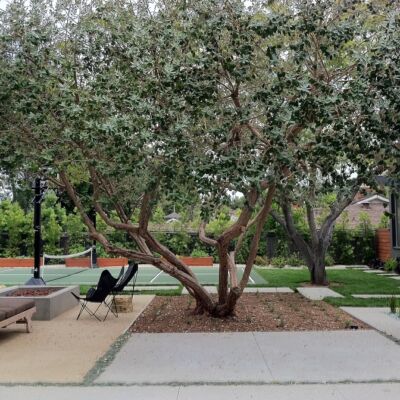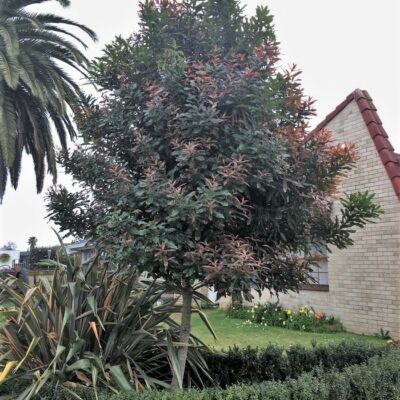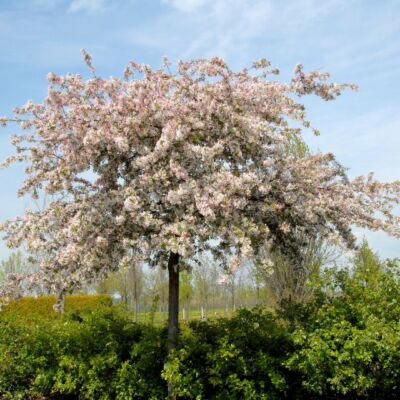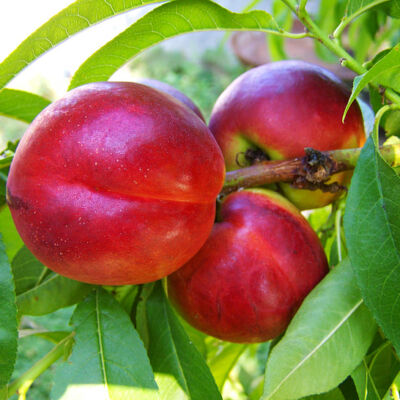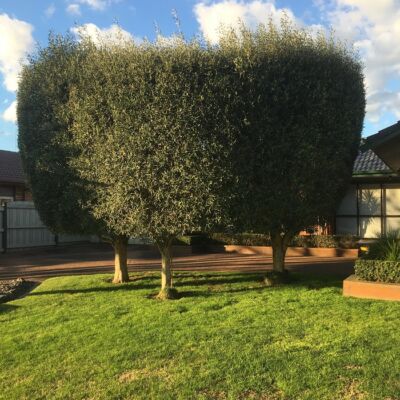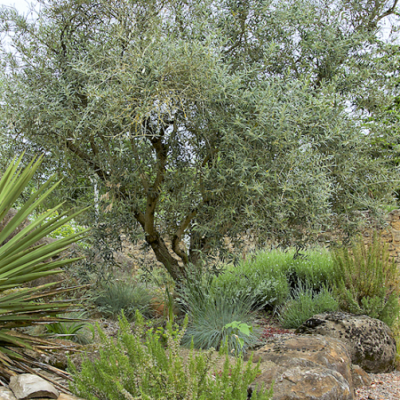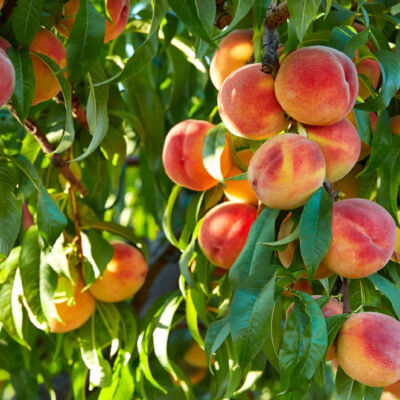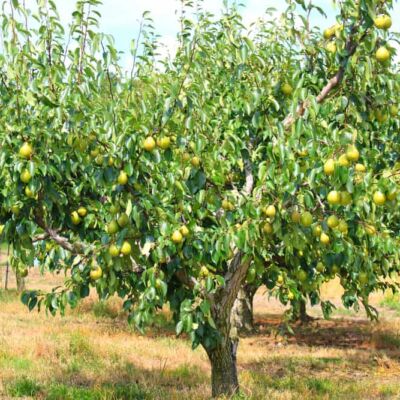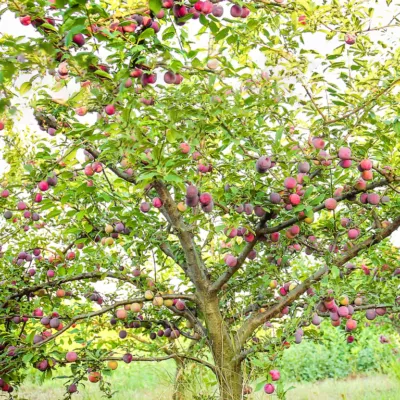Over the past few years fruit tree popularity has grown dramatically! We now have an “orchard” of larger grade fruiting trees available for sale most of them on a medium growing rootstock, ideal for smaller back yards.
-
Apple TREES are cultivated worldwide and are the most widely grown species in the genus Malus. The apple is a deciduous tree, generally standing 2 to 4.5m tall having its origins in Central Asia. When cultivated, the size, shape and branch density are determined by rootstock selection and trimming method. LEAVES are dark green simple ovals with serrated margins. Blossoms are produced in spring at the same time as leaves. FLOWERS are generally white with a pink tinge. The FRUIT matures in late summer or autumn. Different CULTIVARS are bred for various tastes and use, including cooking, eating raw and cider production. Sometimes hand thinning is necessary to avoid overstressing the tree, which may result in a poor crop the following year. However this should not be done until mid-December when the natural fall is complete. ROOTSTOCKS are used to control speed of growth and the size of the resulting tree allowing for easier harvesting. Apple Root Stock: M26: Very Dwarf tree, Under 3.0m M.9 Dwarf tree, To Apx 3.0m, Suits well drained fertile soils. Requires support system: MM106 Semi dwarf tree, To Apx 4.5m. Good on most soils except poorly drained soils MM 793 Larger tree, To Apx 6.0m. Better suited to difficult soils (heavy or clay) Northern Spy Semi dwarf tree. To Apx 3-5m. Wetter ground and Clay. Resistance to woolly aphids. Harvest Season (Apx): EARLY = Jan – Feb. MID = Feb – March. LATE = April – May Make enquiries as to which varieties we have available now or see our online catalogue.
-
Originally domesticated in China, apricots are grown successfully around the world. These small TREES are a manageable size for the home orchard growing to around 4-5m tall. FLOWERS appear in spring with FRUIT (a drupe similar to a small peach, ranging in colour from yellow to orange) ready to harvest Dec - Feb. As they are self fruiting, you typically don't need two apricot trees to produce fruit. They are relatively easy to grow and will produce loads of fruit year after year that can be enjoyed fresh from the tree, made in to jam, bottled or dried. Apricots we supply are better suited to warmer climates. HARVEST is from Dec - Feb. Make enquiries as to which varieties we have available now or see our online catalogue.
-
A handsome, fast growing, subtropical evergreen TREE with large emerald green LEAVES that forms a thick canopy. FLOWERS September to December. FRUIT range in size and shape from round cannonball to pear like. All varieties are self-fertile though the trees will produce more and better fruit if cross pollinated. To get fruiting trees it is highly recommended to get a grafted tree and then generally require a few years to mature before fruiting. Stone grown trees may not produce fruit. Requires free draining deep soil and protection from frosts and cold winds. HARVEST September to April. from Grows Apx 6 x 4m. Make enquiries as to which varieties we have available now or see our online catalogue.
-
A smaller growing bushy TREE it is one of the hardiest of the subtropical fruits, growing in most soils and tolerating several degrees of frost. Feijoas are commonly available as seedlings, but plants grown from cuttings or grafted specimens are more reliable. Attractive red and white FLOWERS also attract birds and are edible as well. FRUIT ripens between April and May and when mature will fall off the tree at a touch. The skin is green and ranges from smooth to rough and dimpled. The pulp is sweet and juicy with a good flavour. Generally require another to cross pollinate although "Unique" is unique in that it doesn't! They respond well to trimming if they become a little tall or woody and can also be used as a hardy hedge. APX: 4.0m - HARVEST: March-May Make enquiries as to which varieties we have available now or see our online catalogue.
-
- Description
An evergreen tree with crisp serrated leaves are a red colour when young but mature to dark green. Pink or white (depending on variety) fragrant flowers are produced from spring to summer followed by a round hard shelled in summer to autumn. These edible nuts that are a rich source of thiamine, vitamin B6, manganese, iron, magnesium and phosphorus. Harvest period, lasting from around March until June. Generally requires another type for cross-pollination. Make enquiries as to which varieties we have available now or see our online catalogue. Height x Width 8 x 4 Height Range Medium 5-10m Growth Rate Moderate Plant Type Tree Shape / Habit Round Country of Origin Australia Similar to Consider - Leaf
Leaf Colour Dark Green - Flower
Flower Colour Pink racemes Fragrant? Yes - Uses
Specimen Yes Good Shade Tree? Yes Accent Yes Bird Feeding Yes Fruit Producing Yes Note: Growth, height and grade information are given in good faith but are subject to natural variables beyond our control. -
- Description
A smaller growing, ornamental tree with long gracefully arching branches. In spring the whole tree becomes covered with bright pink buds opening to white to pale pink flowers. Yellow fruits flushed red soon follow which can be eaten but birds also enjoy. Height x Width 3 x 2.5m Height Range Small 1-5m Growth Rate Moderate Plant Type Tree Shape / Habit Conical Country of Origin Japan Similar to Consider Other Crab apples, Cercis Forest Pansy, Prunus Flowering Cherries - Leaf
Leaf Colour Green Deciduous Leaf Colour Yellow - Flower
Flower Colour Pinks and Reds Fragrant? No - Uses
Accent Yes Bird Feeding Yes Fruit Producing Yes Note: Growth, height and grade information are given in good faith but are subject to natural variables beyond our control. -
A small to medium growing deciduous TREE native to North West China which are very closely related to the peach. Nectarines have arisen many times from peach trees, often as bud sports. LEAVES are green and turn shades of yellow and orange over autumn. FLOWERS in spring are generally pink. Nectarines produce sweet, juicy FRUITS that can be white or yellow, and clingstone or freestone. HARVEST is from Dec - March Make enquiries as to which varieties we have available now or see our online catalogue.
-
- Description
A compact Olive with smaller leaves giving a dense appearance. A consistent small fruiting variety with heavy crops. Has a good oil content and also used for pickling. Being from the Mediterranean olive trees require full sun and will tolerate wind coastal and can also survive extended dry periods. This variety especially good for hedging as it trims well into a dense hedge. Height x Width 4 x 2 Range Small 1-5m Growth Rate Moderate Plant Type Tree Shape Conical Country of Origin Greece Similar to Consider Syzygium resilience, Michelia Figo, Camellias, Pittosporums, Corokia, Griselinia, Ficus, Ilex largo, Eugenia Ventinatii - Leaf
Leaf Colour Green - Flower
Flower Colour Cream very small Fragrant? No - Uses
Accent Yes Screening Yes Hedging Yes Bird Feeding Yes Fruit Producing Yes but small Note: Growth, height and grade information are given in good faith but are subject to natural variables beyond our control. -
- Description
Olea europaea means 'European olive' in Latin and is what we commonly call “The Olive”. Normally grow as a small tree or shrub, and are found traditionally in the Mediterranean Basin. The species is cultivated in all the countries of the Mediterranean, as well as in Australia, New Zealand, North and South America and South Africa. The olive's fruit is grown primarily for oil, eating, or both. The trees is also suitable tree for standardising. Being from the Mediterranean olive trees require full sun and will tolerate wind coastal and can also survive extended dry periods. Grows apx 6 x 3m. Make enquiries as to which varieties we have available now or see our online catalogue. Height x Width 6 x 3 Height Range Medium 5-10m Growth Rate Fast Plant Type Tree Shape Round Country of Origin Mediterranean Similar to Consider Other Olives - Leaf
Leaf Colour Green Olive - Flower
Flower Colour Cream very small Fragrant? No - Uses
Good Shade Tree? Yes Screening / Shelter Yes Bird Feeding Yes Fruit Producing Yes Note: Growth, height and grade information are given in good faith but are subject to natural variables beyond our control. -
Peaches are a small to medium growing deciduous TREE native to North West China. It belongs to the genus Prunus, which includes the cherry, apricot, almond, and plum, and the nectarine. LEAVES are green and turn shades of yellow and orange over autumn. FLOWERS in spring are generally pink. Peaches produce sweet, juicy FRUITS that can be white or yellow, and clingstone or freestone. Harvest: Dec - March. All varieties are self-fertile. Make enquiries as to which varieties we have available now or see our online catalogue.
-
European Pears provide some of the best fruit in the world. It is medium-sized, deciduous TREE native to coastal and mildly temperate regions of Europe, North Africa, and Asia. LEAVES long, glossy green. White FLOWERS appear in spring with HARVEST between Feb to May depending on variety. They are one of the easiest and most traditional fruits for training into espalier form. An excellent choice for the home garden. As most pears need cross pollination, the planting of more than one variety, or a double a grafted tree is recommended. HARVEST: EARLY = Feb – Mar. MID = March –April. LATE = April – May Make enquiries as to which varieties we have available now or see our online catalogue.
-
Its thought Plums may have been one of the first fruits domesticated by humans. They are generally a small to medium deciduous TREE with glossy green LEAVES and white FLOWERS in spring. They are one of the best stone fruits to grow in a home garden as prolific crops of very good quality fruit can be produced with very little work. The FRUIT is firm and juicy with a hard stone in the centre and can range from sweet to tart. Skin is smooth, with a natural waxy surface and are generally various shades of red although there are green and yellow types as well. Some are self-fertile or partially self-fertile but most are planted with a pollinator to ensure good fruit production. HARVEST: December to March Make enquiries as to which varieties we have available now or see our online catalogue.

